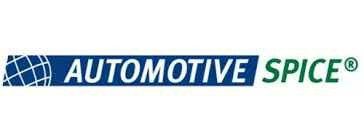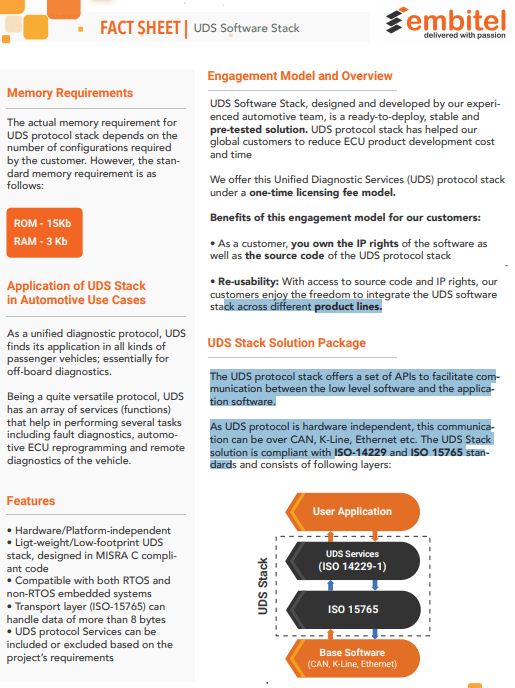ISO 14229 Compliant UDS Protocol Stack for Vehicle Diagnostics






ISO 14229 UDS Protocol: Accelerating Vehicle Diagnostics Implementation
Every vehicle ECU must be equipped with reliable diagnostics feature so that every fault is stored and reported. Unified Diagnostics Services commonly referred to as UDS protocol, is a unified diagnostics services that has emerged as the de-facto vehicle diagnostics protocol.
UDS protocol is defined in ISO 14229-1 standard. By combining several diagnostic services, it enables diagnostics communication between a vehicle ECU and an external diagnostics device. Almost every OEM in current times, utilize UDS to empower vehicle diagnostics for their production programs.
Ready-to-Deploy UDS Protocol Stack: Putting Vehicle Diagnostics in Fast Lane
Embitel offers ready-to-integrate UDS protocol stacks to expedite the vehicle diagnostics functionality.
UDS Protocol Software License Model
- We offer our industry recognized UDS protocol software under a one-time licensing fee model.
- Terms & conditions regarding IP rights and source code ownership of UDS protocol software are completely transparent and fully aligned with the customer’s requirements and vision.
Customized UDS protocol stack (ISO 14229) as per diagnostics requirement
- Custom Development of UDS software for both Server ( ECU) and Client (diagnostic tester)
- Development of ISO-TP (ISO15765) stack to support multi-frame communication
- Configuration of UDS Protocol stack, using our proprietary Qt based tooling solution
Development of Tooling solutions for UDS protocol software
- Unified Diagnostic Service powered tool for ECU diagnostics at service stations
- UDS powered Remote Vehicle Diagnostics
- End of line ECU reprogramming tool
- Fault Code Memory (FCM) Configuration
- Support for Telematics tool development based on UDS
Integration & maintenance of UDS protocol software
- UDS protocol software integration with hardware platform and platform software (integration of CAN, timer, scheduler etc.)
- UDS stack configuration of messages, diagnostic services and more.
- Data Identifier (DID) Configuration based on customer requirement
ODX Tool for UDS configuration
- Generation of ODX file from the diagnostics specifications
- UDS configuration source code generation using ODX file
- Expertise in tools for ODX file generation & UDS configuration such as CANdela and GenY
UDS based Bootloader development
- Development of UDS based bootloader
- Implementation of Seed and Key algorithm for secure bootloader development
- Customization of bootloader software sequence
- CAPL Script development to support UDS based ECU reprogramming
UDS protocol testing and documentation
- Test reports for Unit, Integration and Functional testing of UDS protocol
- Creation of High-Level design document (HLDD) and low-level design document (LLDD)
- Design of Module Test Plan , Integration Test Plan, and Functional Test Plan
200+
customers supported since 2010
100+
scalable and reusable Bootloader platforms delivered
30%
quicker time-to-market enabled
95%
lesser development time with PC-based automation tools
Unified Diagnostic Services (UDS) Factsheet: Know more about Technical Specifications and Solution Package
- UDS protocol software business model
- Benefits of one-time licensing fee engagement model
- Value-add features of our read-to-integrate UDS software stack solution
- Automotive related use-cases of UDS protocol stack
Please refer to UDS software stack FAQ’s for more details.

Customer FAQs About end-of-line testing, MISRA C Code & Flash Bootloader
Ans. UDS protocol is a standard defined in ISO 14229 document. The UDS protocol specifications are independent of physical layer and commonly used over CAN, LIN, Flexray and Ethernet physical layers.
The UDS protocol stack is an ISO 14229 compliant software solution. This UDS software stack is best suited for automotive ECU and tooling applications in Passenger Cars.
- Diagnostic over CAN (as per ISO15765)
- Diagnostic over LIN (as per LINTP)
- Diagnostics over IP (DoIP).

Ans. We can help you generate the ODX file from the specifications provided by either by your team or your customer’s team (OEM).
Our Automotive software team has expertise in tools like CANdela and equivalent.
Also, we can support for generation of UDS Protocol configuration file based on the ODX file. We have developed a proprietary ODX configuration tool to configure our UDS protocol software as per the ODX file. We call it the ODX AutoConfig tool.
- Integration of the UDS stack to your hardware platform
- Integration of UDS solution with target application
- Development of flash bootloader software based on Unified DIagnostic Services (ISO 14229)
- Development of driver modules like CAN, LIN, Ethernet and more
- Verification & validation (testing services) of your target application after UDS integration
- segregating the memory as boot and application area
- implementing boot loader logic in both boot and application
- CRC checks, Flash driver development and more.
Ans. No, our UDS software solution is hardware independent. We also provide CAN drivers as a part of software package. These are designed to ensure hardware abstraction.
Ans. The UDS software stack is complaint with ISO 14229 standard. The software source code is developed using embedded C in compliance with MISRA-C standard.
Across our organisation for software and hardware development, we rigorously also all the quality control best practices as mandated for CMMI level 3 companies.
In order to embed the culture of quality delivery, we have a separate QA team who works closely with the embedded software and hardware development teams to ensure compliance.
Ans. We have more than 11 years of experience and domain expertise in partnering with global automotive OEMs’ and Suppliers.
We have a team of expert automotive software engineers, who have delivered key solutions for integration, end-of-line testing and support for the implementation UDS software stack across multiple platforms.
Ans. We have a well-defined support and maintenance process for your post-production requirements.
As per your project requirements and partnership expectations, post-production support will be part of the SLA at the onset of the UDS stack integration project
Ans. Our business model is designed as a one-time licensing offering. This helps our customers to get access to the UDS software IP rights and also the source code.
The IP rights help your business to reuse the software code across multiple projects.
However the business model can be re-framed according to the business needs of the customer and project specifications
Ans. Yes, we provide end-of-line testing services after the software stack integration. This ensures complete support from our development team in the production environment.
Our team of expert automotive software engineers has experience of working with global automotive OEMs’ and Suppliers for providing integration and conformance testing in compliance with ISO 11783 standard.
Ans. The UDS stack solution can be implemented either as Server or Client as per your project/application requirement.
We can either integrate it into an automotive control unit as a Server or in an external tool like a scanner or telematics unit as a Client.
UDS Protocol Blogs: Learn about Remote Vehicle Diagnostics and UDS on IP (DoIP)
Knowledge bytes
- What is Unified Diagnostic Services (UDS)?
Unified Diagnostic Services is an off-board vehicle diagnostics protocol used extensively in modern vehicles. It is specified in ISO14229 standard. The UDS protocol is based on standards like KWP 2000, K-Line, ISO15765 etc. and is an amalgamation of all the diagnostics services offered by different protocols.
These vehicle diagnostics services facilitate the communication between an external tester tool and the vehicle ECU (Electronic Control Unit) where the diagnostics services are implemented.
With increased complexity of electronic components in the new age vehicle, occurrence of the faults in in-vehicle control units was an unwanted evil that could not be fully avoided.
To help the automotive mechanic professionals to detect and effectively manage these faults, off-board diagnostics services were introduced
With the help of vehicle diagnostics software services, the tester tool is able to read the faults and also reprogram the ECU in order to rectify the faults, if required.
Before UDS came to prominence, there were other diagnostics protocol such as KWP 2000, ISO 15765 and a few others. However, having different protocols posed a serious compatibility issue between vehicles ECUs procured from different suppliers.
A more standardized and unified diagnostic service was needed and that’s how UDS was developed.
- What are the advantages of UDS over other off-board diagnostics protocols?
Being a unified diagnostics protocol, an UDS Software Stack can be integrated with automotive control unit irrespective of its hardware/software specifications.
Also UDS has been developed to be capable of performing a more detailed diagnosis of automotive faults as compared to others.
Its extensive list of services (SIDs) like Diagnostic Session Control, ECU Reset, Read/Write Data and many others make UDS stack deployable across any automotive ECUs for diagnostics and data communication applications
Software Services of UDS Protocol Stack, as defined by ISO 14229 Standard
Our UDS protocol stack as a standard software package supports the following services:
| SID | UDS SERVICES | DESCRIPTION |
|---|---|---|
| 0x10 | Diagnostic Session Control | Enable various diagnostics sessions within ECU |
| 0x11 | ECU Reset | Resetting the ECU to be back in the default session |
| 0x27 | Security Access | Limit access to data and services to prevent unauthorized access |
| 0x3E | Tester Present | Alert the ECU(s) that client is still connected so that diagnostic sessions remain active. |
| 0x22 | Read Data By Identifier | Request data from ECU(s) |
| 0x2E | Write Data By Identifier | Write data onto ECU(s) |
| 0x14 | Clear Diagnostic Information | Clear diagnostic trouble codes (DTC) stored in the ECU |
| 0x19 | Read DTC Information | Read DTC from the ECU |
| 0x2F | Input Output Control By Identifier | Control the input/output signals through the diagnostic interface |
| 0x31 | Routine Control | Control all the routine services (erasing memory, testing routines etc.) |
| 0x34 | Request Download | Request ECU to initiate download session based on request from the tester |
| 0x36 | Transfer Data | Manage actual transmission ( upload and download) of data |
| 0x37 | Request Transfer Exit | Terminate and exit data transfer |
| 0x28 | Communication Control | Manage the exchange of messages in the ECUs |
| 0x85 | Control DTC Setting | Enable/disable updating of DTC settings in ECU |
| 0x87 | Link Control | Control the ECU- client (tester) communication to gain bus bandwidth for diagnostic purposes. |
| 0x23 | Read Memory By Address | Read memory data from the memory address provided |
| 0x24 | Read Scaling Data By Identifier | Read scaling data stored in the server using data identifier. |
| 0x3D | Write Memory By Address | Write information into the server memory location |
| 0x35 | Request Upload | Request ECU to upload data |


